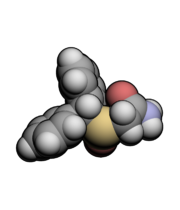Modafinil Fails to Reduce Cancer-Related Fatigue
Modafinil, which is commonly prescribed to manage fatigue in cancer patients, had no effect on fatigue in a new study of patients with non-small-cell lung cancer.
Modafinil molecule

Modafinil, which is commonly prescribed to manage fatigue in cancer patients, had no effect on fatigue in a new study of patients with non-small-cell lung cancer (NSCLC).
“Fatigue is the most prevalent symptom experienced by patients with cancer, occurring in more than 60% of patients and more than 80% of those receiving cancer treatment,” wrote study authors led by Anna Spathis, MSc, of Addenbrookes Hospital in Cambridge, United Kingdom. The central nervous system stimulant modafinil has recently come into vogue as a fatigue treatment in spite of limited randomized evidence for any benefit. In the only randomized trial of patients receiving chemotherapy, “modafinil had a small impact only in a subgroup of patients with severe baseline fatigue.”
In the new trial, 208 NSCLC patients who were not treated with chemotherapy or radiotherapy in the preceding 4 weeks were randomized to either modafinil or matched placebo. Of the total cohort, 160 patients (75 modafinil patients, 85 placebo patients) completed both the baseline and day 28 questionnaires on fatigue and other outcomes.
Fatigue scores improved significantly from baseline to day 28 in both groups. For modafinil patients, the mean score change was 5.29; for placebo patients, the mean score change was 5.09 (P = 0.92). There was still no significant difference between the groups after adjustment for disease stage or age.
Secondary outcomes were also similar between the groups. Both groups saw an improvement in the Epworth Sleepiness Scale, though there was no difference between them (P = .94). There were also no differences between the modafinil and placebo groups with regard to a depression score (P = .39) and a quality of life score (P = .60). Patients were also asked to rate how helpful the study treatment was; 47% of modafinil patients and 23% of placebo patients said it was not helpful (P = .13).
The notably large placebo effect seen in this trial could be due to several factors, the authors noted, including an artifact related to participating in a clinical trial or simply the natural history of fatigue over time in these patients. The latter possibility is unlikely, however, given previous work showing that NSCLC patients tend to experience worsening fatigue over time.
“We argue that the clinically significant benefit seen in both arms of this trial is likely related to the placebo effect,” they conclude. Also notable in the study was a higher withdrawal rate in the modafinil arm: there were more withdrawals due to death, disease progression, and adverse events in the modafinil group than in the placebo group.
Currently, National Comprehensive Cancer Network guidelines recommend consideration of modafinil for cancer patients undergoing treatment. But the authors write that “there is insufficient evidence to prescribe modafinil for patients with cancer-related fatigue outside of a clinical trial context.”
2 Commerce Drive
Cranbury, NJ 08512
All rights reserved.